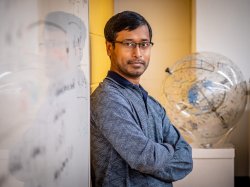Professor awarded grant for NSF supercomputing time
Will train introductory physics students to use Python to solve problems
Posted in: Grants and Awards, Physics, Science and Technology

Shaon Ghosh was recently awarded computing time on the JetStream cloud environment. JetStream is a computing resource that is part of the National Science Foundation’s XSEDE Project. XSEDE—the Extreme Science and Engineering Discovery Environment—is a multi-institutional partnership that allows scientists to remotely access supercomputers and advanced digital resources or computational tools.
Ghosh, an Assistant Professor in the Physics and Astronomy Department since January 2020, will use the computing time to train students in his introductory physics course in numerical problem-solving techniques. The grant provides access to 100,000 CPU hours of computational time on the JetStream architecture, with an estimated value of $2000.
“Learning to code a computer to solve scientific problems is an indispensable part of physics education,” says Ghosh. “But often students do not get an opportunity to learn this skill until their higher-level undergraduate classes. There is a very steep learning curve by that time that can be discouraging to some students. This course will give the students an opportunity to get acquainted with scientific programming at the earliest possible stage of their physics curriculum.”
Students in Ghosh’s course will remotely run codes in the Python programming language, using a JupyterHub computational environment. They will learn techniques such as root finding, numerical integration, and solving differential equations.
“Professor Ghosh’s expertise is in gravitational-wave data analysis, and he brings a depth of knowledge about high-performance computing to our department,” says Marc Favata, chairperson of the Physics and Astronomy Department. “Getting introductory physics students deeply involved with computational thinking is an ambitious but important goal. I’m very glad to see that he is already finding ways to use his expertise to improve the training of our students.”
